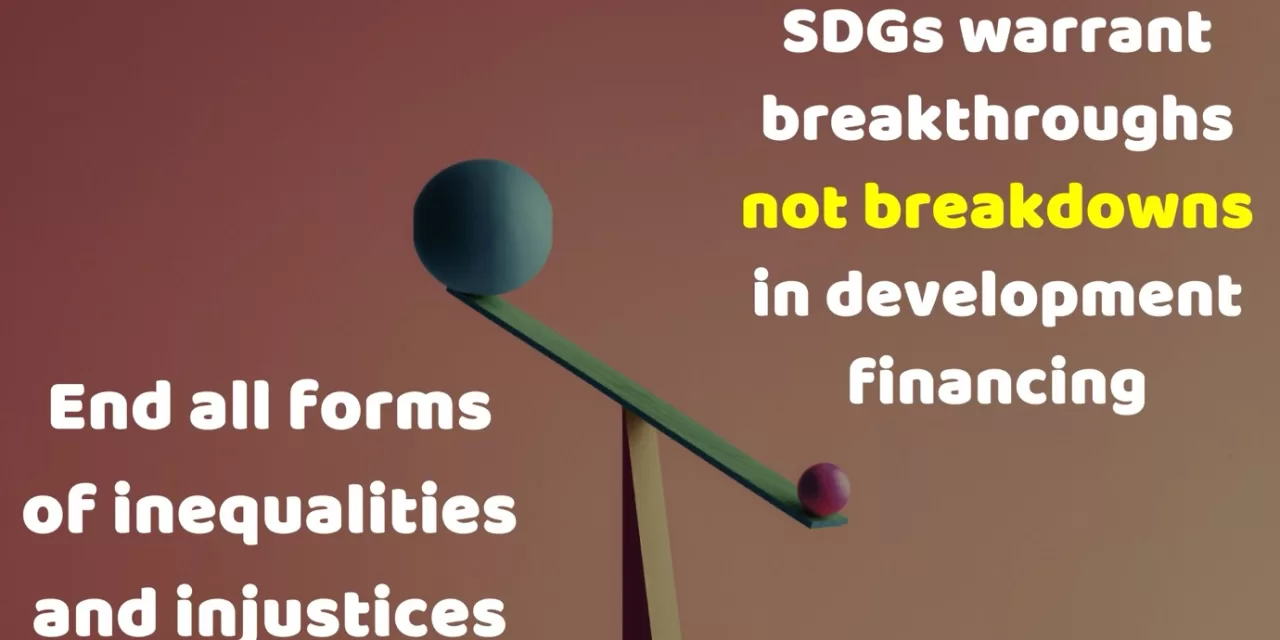Decisions of US President Trump have precipitated a funding crisis in many low- and middle-income countries for health and development programmes, including lifesaving medicines and disease prevention and surveillance initiatives. But development financing was not in a good spot even before Trump’s election as US President for another term.
If we look at debt-ridden nations of the Global South that have been arm-twisted by the Global North nations (or their so-called ‘banks’) to prioritise debt repayment over funding their domestic health and development programmes, the warning has been etched on the proverbial wall for quite a long time.
The upcoming fourth financing for development conference, where governments will convene in June 2025, is an important moment indeed. but would it be game-changing when it comes for development financing or further exacerbate the crises, is yet to be seen.
Development effectiveness must be the central mantra
“A call for breakthroughs not breakdowns” given out by CSO Partnership for Development Effectiveness (CPDE) best contextualises the situation and proposes key pathways forward. “Over the past years, it has become increasingly evident that the community of traditional donors is struggling to meet long standing commitments. On top of these persistent challenges,we are currently witnessing unilateral decisions that are reshaping the development landscape, in ways that contradict the fundamental principles of development cooperation of democratic ownership, transparency and accountability, inclusive partnerships, and a focus on results. As we head towards the Seville Financing For Development (FfD) Intergovernmental Conference, we must seize the opportunity to reset the discussion, and insist on the track that honours the foundational commitments of international cooperation.”
“Since the early 2000s, the UN’s Financing for Development (FfD) process has pledged to enhance both the quantity and quality of development cooperation. But today, we face multiple global crises, a derailing of the Sustainable Development Goals (SDGs), and a beleaguered aid system. It must then be the duty of the Seville FfD conference to rally governments and all development actors to heed the call of the times, and reboot development cooperation to effectively address these urgent challenges,” it adds.
Zero draft falls short
The Zero Draft of the FfD4 Outcome Document was released on 17 January 2025. This Zero Draft falls short of being the transformative document it needs to be. It provides clear references and messages but lacks ambition in the areas of time-bound commitments, actionable priorities, and substantive reforms.
“Notably, the initial sections of the Zero Draft (paragraphs 6 to 9) also have plenty of language that can be traced back to the effectiveness conversation – a testament to the continuing relevance of the agenda. References to inclusiveness and effective governance, mentions of aligning with today’s realities and countries’ policy space (para 6), discussions on country-led financing strategies (para 7), and an explicit acknowledgment that countries bear primary responsibility for their strategies, are most welcome. In the same vein, the Draft emphasises effectiveness, efficiency, and transparency in resource mobilisation as well as commitment to developing effective, accountable and inclusive democratic institutions (para 8), and highlights the role of civil society (para 9). There is a section on development effectiveness (para 40) that underscores ongoing systemic challenges, such as fragmentation, smaller transactions, earmarking, and circumvention of government budgets,” reads the statement by CPDE. “While these are all appreciated, they simply reaffirm existing commitments on ODA and development effectiveness principles, without raising the ambition, correcting digressions, or establishing credible mechanisms to ensure compliance.”
Uphold past commitments, but push the limits on aid volume
To put forth a responsive and meaningful FfD Outcome Document, CPDE calls on governments to agree on scaling up and achieving the 0.7 GNI target as well as having mechanisms for enforcement to beat the inertia of this unfinished business. With the dilution of what can be classified as aid and the difference between what is committed and what is disbursed, there has been an alarming decline in the share of ODA that reaches developing countries that must be immediately addressed. The concessional nature of ODA must be preserved, and alignment with the SDGs must be a precondition. ODA is a unique and important resource even when compared to other forms of development cooperation, and its disbursement is determined by public policy that is flexible, traceable, and accountable.
Shortfall in commitment is unmet ODA debt
To make a significant impact the cumulative shortfall in Development Assistance Committee’s (DAC) commitment, estimated at USD 7.1 trillion, must be recognised as unmet ODA debt that can be delivered to countries of the Global South over time in full and unconditionally, says CPDE statement. “Recovering unmet targets from previous years as an additional mechanism for financing development initiatives can help ease financing stress and address top socio-economic priorities in developing countries, such as poverty eradication, health, education, gender equality, and social protection. In the context of recent developments, volatility and predictability challenges that affect actual flows to partner countries need urgent attention.”
Revitalise effectiveness agenda to put countries in the drivers’ seat
The FfD Zero Draft cites broad consensus that the effectiveness agenda needs to be revitalised and its implementation better monitored. The emphasis on addressing fragmentation, elevating country leadership, improving alignment, and supporting policy coherence may indicate the direction of this revitalisation process. “While these are all important aspects of safeguarding aid quality, revitalisation should ensure that ODA and any other form of development cooperation and development partnership is effective, rights-based, accountable, and directed towards democratic country ownership, which includes locally-led development. A strict set of rules must be developed around how development cooperation and, in particular, ODA should be used, and fulfill its core mandate of eradicating poverty and addressing inequalities, with the development priorities set by the right-holders at the centre. Finally, this revitalisation should recognise and support the vital role of civil society in ensuring an effective aid architecture – one that is locally-led and focused on addressing poverty and inequalities,” says CPDE statement.
Define decisive mechanisms to turn commitments to change
“The upcoming Financing for Development conference can, and should, decide to establish a UN intergovernmental process towards agreeing on a legally binding convention on development cooperation that includes developing measurable, time-bound, and enforceable indicators for the fulfilment of these targets,” demands CPDE.
The CPDE statement ends with a strong reminder for FfD stakeholders to take immediate action: “We need a breakthrough in asserting the effectiveness agenda in development finance, or we face the breakdown of our shared aspirations around sustainable development.”
Shobha Shukla – CNS (Citizen News Service)











